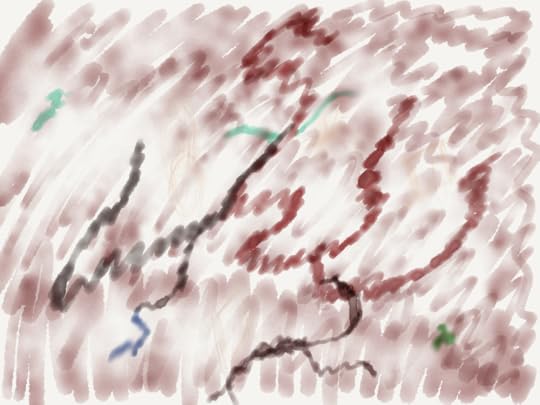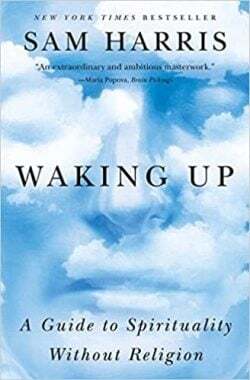Consciousness is a Movie Screen Without an Audience, Theater, or Universe

I tried and failed to get into meditation for decades. I read all the books and watched lots of video, with no success. I was close to declaring it wasn’t going to happen for me.
My first success with it came from Sam Harris’ Waking Up book and mobile app. Sam explains consciousness and mindfulness better than anyone I’ve found, and now I’m happily a novice.
You’re probably saying to yourself:
Ok, fine, but why am I reading an article on consciousness from a novice?
Great question. The answer is that the thing I’m about to teach you is a way of thinking about consciousness and meditation that anyone can learn—even before you start practicing.
It all starts with five basic ideas that build off each other.
There is nothing in your life that you experience outside of the lens of consciousness; it’s is our only lens.When you realize everything you experience is part of consciousness, it follows that the sensation of you being a separate observer of consciousness is part of that—meaning the very idea of “you” separate from consciousness—is an illusion. This is why people talk of, “being one with consciousness”.There are two states you can be in when you’re conscious: distracted, and mindful. Most people spend their entire lives in the distracted state.When you’re distracted, you become the contents of your consciousness. So if you have angry thoughts and you feel disrespected and resentful, you become those things. If you’re mindful, you can sit within consciousness and merely witness its contents. In that mode, thoughts and feelings are appearing but you are not becoming them as they do so. The value of mindfulness is in the ability to spend more time in the mindful state rather than the distracted state, and to be able to switch there whenever you need to during everyday life.These five points are the centerpieces of what I’ve learned from all the books, study, and sessions I’ve done so far— including all the meditation material I studied but didn’t understand before getting unlocked by Waking Up.
The Movie Screen

But don’t worry if you didn’t get all—or even much—of that. The five concepts are not why we’re here. We’re here to talk about The Movie Screen, which is the best metaphor I’ve found for explaining these five concepts in a tangible way.
Imagine a massive IMAX movie screen in a brand new theater. Just a giant flat screen. Seamless and boundless.
Now imagine it floating in empty outer space. There’s no theater. There’s no projector. And there’s not even an audience. You’re not even there. In fact, there’s no universe at all. There’s just The Movie Screen.
That movie screen is your consciousness. Be ready to call this screen to mind as we proceed.
Distraction vs. mindfulnessOk, call up the screen—a single pane floating in space. All of reality plays on the screen. If you’re experiencing it, it is playing there and can play nowhere else.
Now, close your eyes and take inventory of what you’re experiencing. Notice the sounds, the variations in light behind your closed eyes. And notice the thoughts that come streaming in. Notice the feeling of clothes on your body. Notice the feeling of having limbs. Of feeling warm or cold. Just notice. Notice everything.
That place you just visited was The Movie Screen of your own consciousness. It is the only place where anything can happen in your life.
While you are awake, that screen never stops. The only question is whether you’re paying attention or not. If you are not paying attention, things will play on that screen and they will affect your behavior. Someone will be rude to you, or ignore you, or will discount an idea that you wanted to be heard.
Most people spend their lives acting out their inputs in perpetual distraction.
The emotion of anger will play on your screen, and because you didn’t notice it playing, it will become you. You will walk around angry for minutes, or hours, or maybe the entire day. You won’t usually notice, or know exactly why. You’ll just feel like that, and you’ll be a worse friend, a worse co-worker, a worse partner, or a worse parent—all because a thing played on the screen that you didn’t witness and observe.
What this practically means is that you become your inputs. You absorb anger, you become anger. You absorb sadness, you become sadness. This is what happens to people who cannot look at their screen. They are walking string puppets acting out what happened on their screens while they weren’t looking. And most of the world lives every moment of every day like this.
Yuval Harari meditates for 2 hours a day, and he says it’s the only reason he can finish writing books.
But there’s a simple alternative, which is to switch into the state of mindfulness. Not for a decade on a mountain like a monk, but just for a moment, or a few seconds, or maybe 10 minutes a day.
When understood and practiced this way, mindfulness works instantly. Simply close your eyes and observe.
How did that comment make you feel? Did you feel hurt? Angry? Aggressive? Sad? Stare directly into that emotion on your screen and you’ll see something remarkable happen.
It will dissipate almost instantly.
When you observe things playing on your screen—whether they are thoughts or emotions—that you don’t want to affect you, you remove their ability to do so. They become actors on a screen. Temporary occurrences that have a beginning and an end.
Keep in mind that the sensation of you being separate is also another actor on the screen.
While you are in that state, the world calms. Things are playing, and you are observing. In fact, you’re just one of the things playing yourself. That’s all there is. Notice it. Notice everything. Observe every itch, every pain, every prompt, every smell, every sound, and every breath.
The real currency isn’t money or time—it’s attention.
Time slows and everything fades. There is only that.
Now, if you’re not trained in this, you’ll inevitably fail at this after a few seconds and you’ll make the mistake of becoming distracted. You’ll let a thought hit you instead of observing it directly.
You will become that thought.
Join the Unsupervised Learning CommunityI read 20+ hours a week and send the best stuff to ~50,000 people every Monday morning.Once you do you’ll become the puppet again. Flying through life feeling whatever, thinking whatever, doing whatever. You might be driving, or working, or talking with someone. But you won’t be yourself; you’ll be the manifestation of whatever’s playing on your screen without you paying attention. You cannot control the next thought that pops into your mind. But you can decide to go into a mindful state so you’re ready for the next one.
That’s all mindfulness is. It’s deciding to be an observer in control instead of a puppet.
Your new superpower

I use Waking Up’s 10-minute daily meditation for this.
I practice mindfulness for 10 minutes every morning. I’d like to do 2 hours like Yuval Harari, and maybe I will someday, but the power from meditation isn’t just in the long sessions you do to start or end a day.
As Sam Harris constantly reminds us, and as we talked about above, the true power of mindfulness is in the ability to call on it whenever we want.
Are you in a frazzled state? Did you just receive some troubling news? Are you feeling overwhelmed?
Pull up your screen and observe what’s playing on it.
If you’re a Star Trek fan it’ll be a lot like coming out of warp and landing in the middle of a massive ship battle. Chaos all around you. Wow! This is what was happening? No wonder I felt bad!
When you spend your life distracted, it’s as if that time didn’t happen at all.
Watch the screen. Observe. Every feeling. Every itch. Every thought. Your emotional backdrop. The state of your body. Feel your tongue in your mouth. Hear every sound. Notice everything that’s playing. Watch every actor closely. Pay them the respect of attention.
You’re back in control. You’re back in a state of peace. Not because those things aren’t happening, but because you aren’t becoming them.
You can do this at any moment of any day. It’s mindfulness, and it’s a superpower.
Collapsing the illusion of selfWe can use this same power to evaporate the illusion that we are separate from our consciousness.
Any time you feel a sensation of “you-ness”, a sense of identity, like a sense of seeing out of your eyes, of having a head—or being over “here” while those things are over “there”—notice that those are all things playing on the screen as well.
Paying attention magnifies the value and duration of your experience—like living additional lifetimes.
Notice this new actor on the screen wearing a shirt that says, “It feels like I have a head”. If you’re distracted, it just feels like you have one. But if you’re paying attention it’s a guy on-screen wearing a silly t-shirt with text on it.
This is a special screen, remember. It doesn’t just play images. It plays all sensations. Sight, sound, smell, taste, and even emotions. One of the things it can play is the sensation of perspective. Like being inside your body, or being here relative to a thing that’s far away. Or feeling a poke on your foot as being further away than a poke on your cheek. Those are all perspective sensations playing on the screen.
One of those sensations is the feeling that you’re separate from the screen.
SummaryEverything you experience happens in consciousness.This includes the sensation that you are separate from consciousness.A good model for consciousness is a giant, flat movie screen suspended in space. Everything that you experience—from sensations to thoughts to emotions—are things playing on that screen.There are two states of consciousness: 1) being distracted, i.e., ignoring what’s playing on your screen, and 2) being mindful, which is paying attention to everything playing on your screen.If you’re distracted, you become what happens to you and how those things make you feel. If you are mindful, you can simply observe what happens and avoid becoming your inputs.Daniel Miessler's Blog
- Daniel Miessler's profile
- 18 followers




